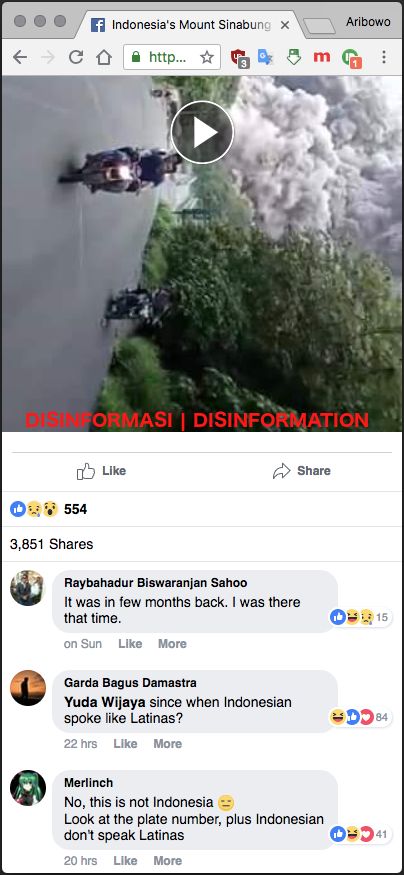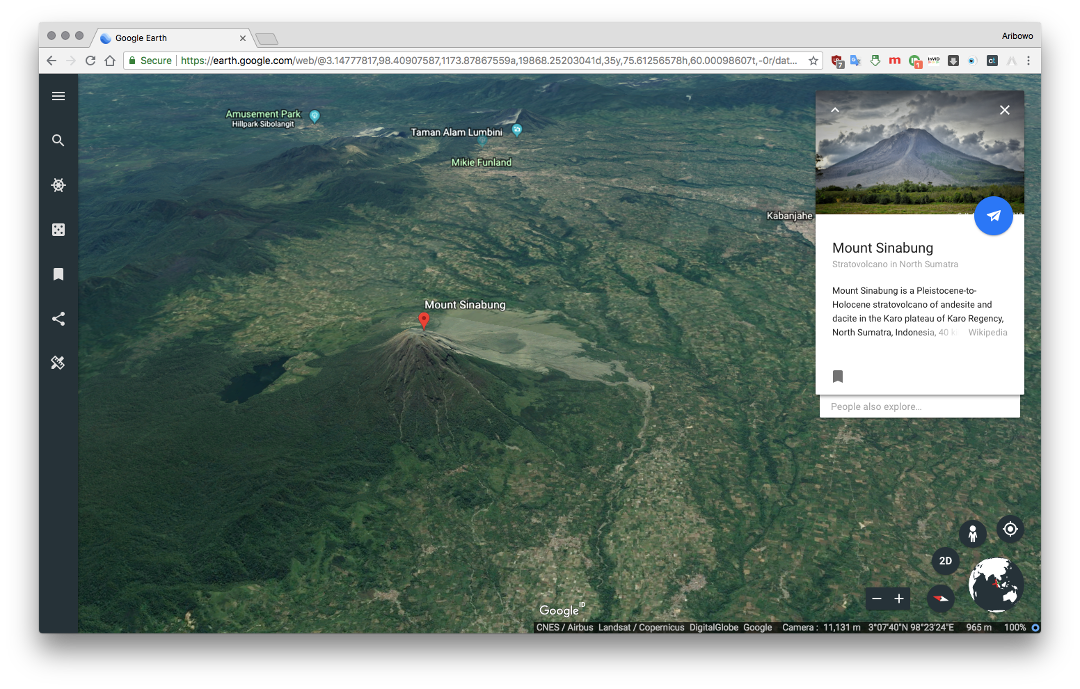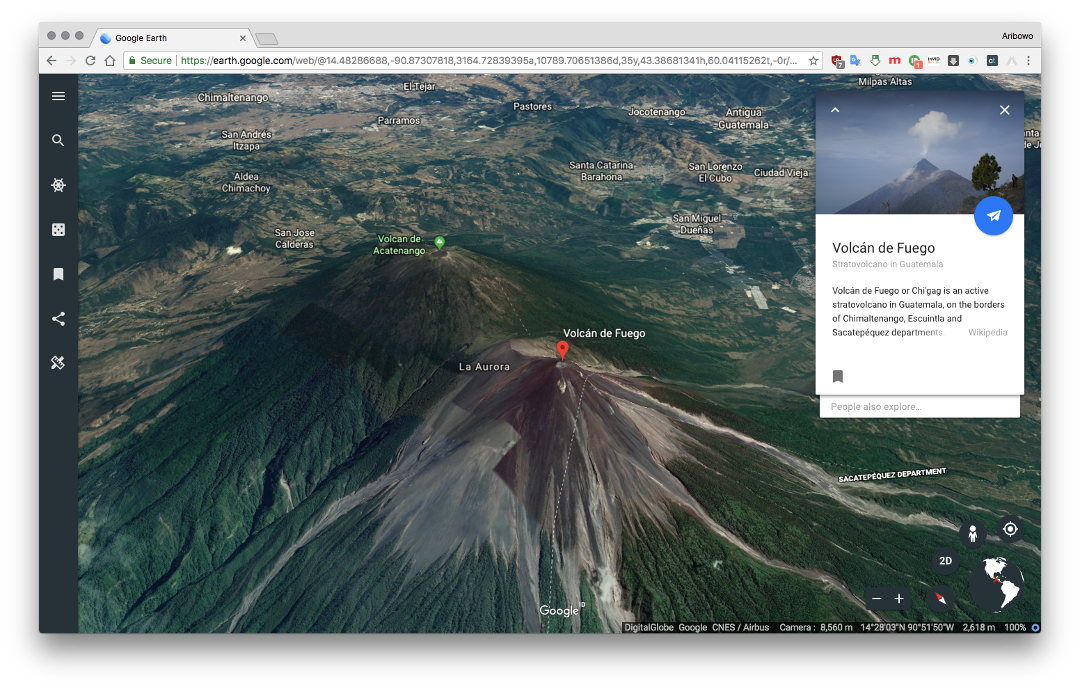Video yang disertakan di post adalah video erupsi gunung Fuego di Guatemala, bukan gunung Sinabung di Indonesia. Selengkapnya di bagian PENJELASAN dan REFERENSI.
The video attached to the post is video of Fuego volcano eruption in Guatemala, not mount Sinabung in Indonesia. Check EXPLANATION and REFERENCE section for more.
======
KATEGORI | CATEGORY
Disinformasi | Disinformation.
======
SUMBER | SOURCE
http://bit.ly/2MZVFug, post dari akun Facebook “Sumit Roy” (facebook.com/sumit.roy.522), sudah dibagikan 3.851 kali per tangkapan layar dibuat | post from Facebook account “Sumit Roy” (facebook.com/sumit.roy.522), already shared 3.851 times per screenshot was taken.
======
NARASI | NARRATION
“Indonesia’s Mount Sinabung Volcano Erupted Today and the Photos Are Spooky as Hell
Pictures are disturbing”.
======
PENJELASAN | EXPLANATION
http://bit.ly/2rhTadC, firsdraftnews.org: “Konten yang Salah
Ketika konten yang asli dipadankan dengan konteks informasi yang salah”.
——
http://bit.ly/2qYG8Rs, firsdraftnews.org: “FALSE CONTEXT
When genuine content is shared with false contextual information”.
======
REFERENSI | REFERENCE
(1) http://bit.ly/2IuLwm0, Youtube.com: “See residents flee erupting Fuego volcano in Guatemala
CNN
Published on Jun 4, 2018
The death toll from Guatemala’s Fuego volcano eruption keeps rising, and now more hazards threaten grieving residents.
At least 62 people were killed after the volcano erupted Sunday, spewing a river of lava and plumes of smoke almost 6 miles into the air, said Mirna Celedon, spokeswoman for Guatemala’s Institute of Forensic Sciences. Thirteen of the dead have been identified so far.”
——
(2) http://bit.ly/2MrnoDn, tempo.co: “Gunung Berapi di Guatemala Meletus, 25 Orang Tewas
Reporter: Non Koresponden
Editor: Choirul Aminuddin
Senin, 4 Juni 2018 16:33 WIB
(foto)
Gunung berapi Fuego memuntahkan lava yang terlihta dari Alotenango, Guatemala, Minggu, 3 Juni 2018. Gunung berapi tersebut menyemburkan abu vulkanik dan batu setinggi sekitar 10km ke udara. (AP Photo/Luis Soto)
TEMPO.CO, Jakarta – Sedikitnya 25 orang tewas dan 300 lainnya luka-luka setelah gunung berapi Fuego di Guatemala, Amerika Selatan, meletus pada Ahad petang, 3 Juni 2018, waktu setempat. “Letusan gunung berapi tersebut menyemburkan abu pekat dan lahar panas di sekitar gunung,” tulis Al Jazeera, Senin, 4 Juni 2018, mengutip keterangan badan bencana alam Guatelama.
Menurut Kepala Sekretaris Jenderal Bencana Alam Conred Sergio Cabanas, korban letusan gunung berapi itu dikhawatirkan akan terus bertambah sebab banyak kawasan penduduk yang belum bisa dijangkau petugas keamanan dan keselamatan setempat.
(foto)
Petugas pemadam kebakaran meninggalkan area evakuasi dekat gunung berapi Fuego di El Rodeo, Guatemala, Minggu, 3 Juni 2018. (AP Photo/Santiago Billy)
“Korban tewas termasuk seorang pekerja Concred dan sedikitnya tiga orang anak,” kata pejabat keselamatan kepada media.
Adapun Angkatan Bersenjata Guatemala kepada awak media mengatakan telah mengevakuasi 3.100 orang dari sekitar gunung berapi ke wilayah yang berjarak 70 kilometer sebelah barat daya Kota Guatemala.
Tak lama setelah berita letusan gunung beredar luas, Presiden Jimmy Morales berkunjung ke markas Conred pada Ahad petang, kemudian menggelar rapat kabinet. Hasilnya, negara menyatakan darurat di negara bagian Chimaltenango, Sacatepequez, dan Escuintla.
(foto)
Seorang tentara mengevakuasi anak yang diselimuti oleh abu vulkanik gunung berapi Fuego di El Rodeo, Guatemala 3 Juni 2018. REUTERS/Fabricio Alonzo
Sebelumnya, Guatemala dihantam bencana letusan gunung pada September 2012 yang menyebabkan 10 ribu orang harus mengungsi ke tempat aman. Kemudian pada Februari 2015, lahar gunung berapi Guatemala meleleh hingga mendekat ke lapangan terbang utama negara tersebut.
Baca: Ikuti AS dan Guatemala, Paraguay Pindahkan Kedubes ke Yerusalem
Dalam catatan sejarah, Guatemala pertama kali dilanda letusan gunung berapi pada 1531. Guatemala memiliki dua gunung berapi yang siap meletus, di antaranya Gunung Pacaya yang terletak hanya 20 kilometer dari Kota Guatemala.”
——
(3) https://bbc.in/2lAT6CA, bbc.com: “Guatemala volcano: Dozens die as Fuego volcano erupts
4 June 2018
(video)
Video shows Guatemala’s most violent volcano eruption in more than a century
Guatemala’s most violent volcanic eruption in more than a century has killed 62 people, officials say.
Dozens more are missing, the country’s disaster agency says, and it is feared the death toll could rise.
Villages on the slopes of Fuego volcano were buried in volcanic ash, mud and rocks during Sunday’s 16-hour eruption.
Pyroclastic flows, which are fast-moving mixtures of very hot gas and volcanic matter, rushed down the mountainside and engulfed villages.
President Jimmy Morales has declared three days of national mourning.
A further pyroclastic flow on Monday sparked alarm.
Guatemala’s coast has also been hit by an earthquake though there are no reports of damage so far.
What has happened?
Fuego, about 40km (25 miles) south-west of the capital Guatemala City, spewed rock, gas and ash into the sky.
Fast-moving flows hit villages, killing people inside their homes.
(photo)
NATIONAL POLICE OF GUATEMALA
The destruction wreaked by the flows can be seen from the air
Sergio Cabañas, head of the country’s National Disaster Management Agency (Conred), said the town of El Rodeo had been “buried”.
Other towns affected include Alotenango and San Miguel Los Lotes. Rescuers are still trying to reach a number of villages.
Temporary shelters have been set up for about 3,000 residents who have been evacuated.
(photo)
AFP
A woman in San Miguel Los Lotes has missing relatives
Efrain Gonzalez, who fled El Rodeo with his wife and one-year-old daughter, said he had had to leave behind his two older children, aged four and ten, trapped in the family home.
Local resident Ricardo Reyes was forced to abandon his home: “The only thing we could do was run with my family and we left our possessions in the house. Now that all the danger has passed, I came to see how our house was – everything is a disaster.”
(video)
Volcano survivor: “I think my family was buried”
About 1.7 million people have been affected in four regions. The country’s main airport has now reopened.
Officials have advised people to wear masks as protection against falling ash.
How exceptional was the eruption?
Fuego is one of Latin America’s most active volcanoes. A major eruption devastated nearby farms in 1974, but no deaths were recorded.
Another eruption in February this year sent ash 1.7km (1.1 mile) into the sky.
Sunday’s event was on a much greater scale.
This eruption is one of Guatemala’s deadliest such events since 1902, when an eruption of the Santa Maria volcano killed thousands of people.
Guatemala’s national institute of volcanology, Insivumeh, told people to keep away from the affected ravines as there is a possibility of “a reactivation”.
The institute also warned of the possibility of lahars – when water mixes with volcanic deposits forming a destructive debris flow – which could affect villages and hamlets to the south, south-west and south-east.
What is a pyroclastic flow?
By Paul Rincon, science editor, BBC News website
A pyroclastic flow is a fast-moving mixture of gas and volcanic material, such as pumice and ash. They are a common outcome of explosive volcanic eruptions, like the Fuego event, and are extremely dangerous to populations living downrange.
Just why they are so threatening can be seen from some of the eyewitness videos on YouTube of the Guatemalan eruption. In one, people stand on a bridge filming the ominous mass of gas and volcanic debris as it expands from Fuego.
Some bystanders only realise how fast it is travelling as the flow is almost upon them.
The speed it travels depends on several factors, such as the output rate of the volcano and the gradient of its slope. But they have been known to reach speeds of up to 700km/h – close to the cruising speed of a long-distance commercial passenger aircraft.
In addition, the gas and rock within a flow are heated to extreme temperatures, ranging between 200C and 700C. If you’re directly in its path, there is little chance of escape.
The eruption of Vesuvius, in Italy, in 79 AD produced a powerful pyroclastic flow, burying the Roman towns of Pompeii and Herculaneum under a thick blanket of ash.
(photo)
Eyewitness account: ‘Day turned into night’
From Jorge Luis Altuve, member of Guatemala’s mountain rescue brigade
A team of about 40 of us from mountain rescue were up on the volcano searching for a person who had gone missing last week.
We’d located the body of the missing person and were going to retrieve it when the activity of the volcano increased quite suddenly. We were at a height of about 3,700m (12,000ft) and not far from the crater when we decided to abort the operation and descend.
At first, we thought it had started to rain but then I heard something hitting my safety helmet and I said to one of my colleagues: “This is not rain, these are stones!”
The stones raining down on us started getting bigger and bigger. Some were as big as 5cm (2in) in diameter. We’d already started our descent from the mountain when the ash cloud reached us and day turned into night.
(photo)
REUTERS
This police officer stumbled as he ran through pyroclastic deposits on Monday
From daylight it went to being as dark as at 10pm. Luckily we were carrying all of our equipment which includes torches and helmets and we also know the volcano very well.
We started to move a lot more quickly. We were also in constant communication with our colleagues at the mountain rescue command post and they kept telling us: “Get out of there! Get down, quick!”
In total it took us three or four hours to reach the command post. Luckily we got away unscathed, just with some bruises from the falling stones.
This really came as a surprise, there had been no alert when we’d set out to search for this missing person.
We only really realised the magnitude of this when we got back down and saw everything covered in ash and bridges destroyed.”
——
(4) http://bit.ly/2tCgBig, Google Earth: Mount Sinabung Indonesia.
——
(5) http://bit.ly/2KnrzPQ, Google Earth: Volcán de Fuego Guatemala.
======
CATATAN | NOTE
Dipublikasikan juga dalam Bahasa Inggris karena SUMBER menggunakan bahasa tersebut | also published in English because the SOURCE is using the language.
======
Sumber | Source: https://www.facebook.com/MafindoID/posts/1186663901473246, https://www.facebook.com/groups/fafhh/permalink/670101563322382/






